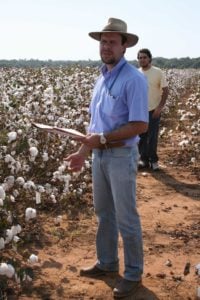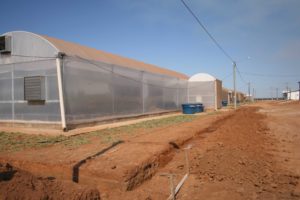After years of decisions and appeals before the World Trade Organization, Brazil is preparing to levy sanctions on U.S. imports and intellectual property rights because of illegal export subsidies provided by the U.S. government to domestic cotton producers. Brazil initially brought the case before the WTO to demonstrate the harmful impact of such subsidies upon both its national farmers as well as African family farmers who cultivate cotton for a market distorted by such U.S. subsidies. The result, cotton farmers everywhere, except the U.S., are forced to sell at lower prices because of the entry of subsidized product into the market.

Cotton researchers in Primavera do Leste, Mato Grosso
The cotton conflict between Brazil and the U.S. makes transparent the balance of power between an increasingly protectionist superpower and an emerging giant now adept at growing through global market opportunities. After decades of import substitution industrialization guided by an inward oriented development model, Brazil has finally embraced the global market as a driver of development, economic growth, and even equity between nations. The cotton rift, for Brazil, demonstrates the illiberal intentions and bad faith of the U.S., made worse this weak by the new U.S. ambassador to Brazil, Thomas Shannon, and his confession that if Brazil moves forward with WTO certified sanctions the U.S. will likely seek retaliation outside the legal framework of the WTO. With all the talk about Shannon being the right diplomat for the job (yes, I’m guilty as charged), his first major pronouncement replicates the same old, arrogant trade tactics. Remember when President Reagan attacked Brazil’s “market reserve” policy for the computer industry and announced the threat of trade sanctions on Brazilian imports on Brazilian independence day, September 7, 1985… in a move designed to shore up electoral support for the Republican party.
Back to the cotton conflict, tomorrow an interministerial group will present its report to Brazil’s Chamber of Foreign Commerce (CAMEX), suggesting a menu of sanctions on U.S. imports to be adopted by the Brazilian government. Yes, if the Lula administration moves forward with these WTO approved sanctions, it will further distort global markets and likely increase the prices on equivalent products purchased by Brazilians. There is still a chance that the U.S. State Department, the U.S. Trade Representative, and U.S. Ambassador Shannon can work out a deal with the the Itamarty and Minister Amorim, but don’t bet on it given the recent track record of international trade negotiations between the U.S. and Brazil. This leaves Brazil in the lurch, should the country impose WTO endorsed punitive tariffs to uphold the principle and law of free trade; or should it decline and take a different road, the higher road?

Cotton Producers Research Facility in Primavera do Leste, Mato Grosso
Brazilian cotton producers argue that the government should sanction, with the proceeds going to a fund to assist growers conduct research and development. Currently, many cotton producers in Brazil are spending considerable efforts and resources to develop viable seed crops for biodiesel production, including cotton, cardamon and other crops that are easily rotated. In recent years, Brazilian cotton growers have demonstrated a track record of trying to innovate to meet the feedstock demands of the fast growing biodiesel industry in Brazil. Such a fund promises to accelerate this collective effort. Maybe in this case, sanctioning U.S. imports might just turn out to be the high road.